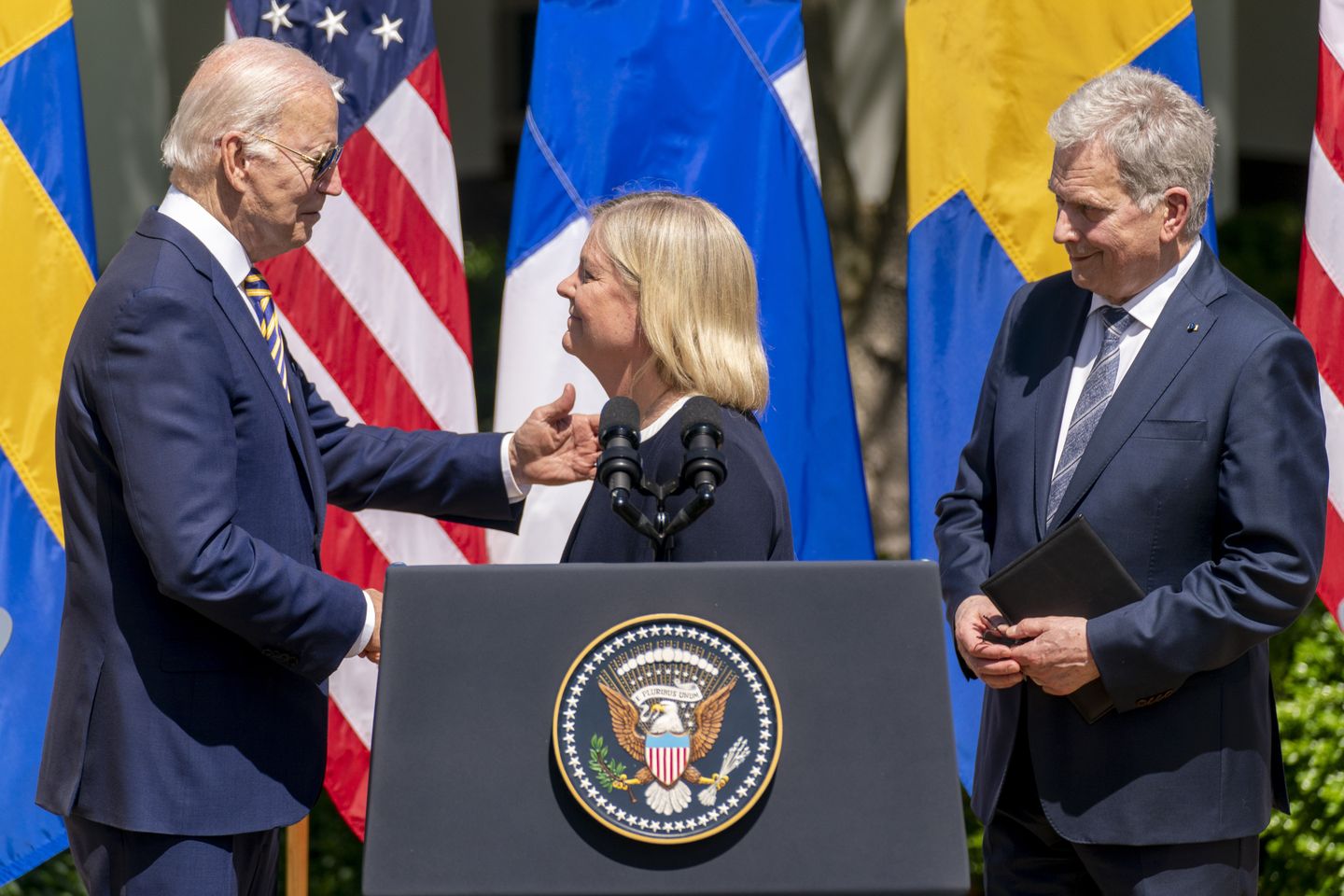

The Biden administration and its allies put their aid push for Ukraine into overdrive Thursday, with President Biden approving a $40 billion package of economic, security and humanitarian assistance and a second $100 million shipment of lethal military equipment and the Group of Seven financial ministers agreeing on a reported $18.4 billion in budget support for Kyiv as it struggles to turn back invading Russian forces.
In another move likely to anger the Kremlin, Mr. Biden personally hosted Finnish President Sauli Niinisto and Swedish Prime Minister Magdalena Andersson at the White House, doubling down on promises of U.S. security assistance just one day after the two Nordic nations submitted formal applications for membership in NATO. Russian President Vladimir Putin had repeatedly cited NATO’s expansion eastward as one reason for his decision to invade Ukraine nearly three months ago.
“The president, prime minister and I committed that we’re going to work together to remain vigilant against threats to our shared security and deter and confront any aggression while Finland and Sweden are in the succession process,” Mr. Biden said during his remarks in the Rose Garden after the leaders met.
“Nothing’s going to be missed,” he said. “We’re in once it is moving forward. I really mean it.”
The Senate Thursday passed the $40 billion military and humanitarian aid package on Thursday on an 86-11 vote after a series of partisan fights delayed its consideration for a week. The final package was $7 billion more than Mr. Biden’s original request. Overall, more than 30 Republicans joined with all 50 Senate Democrats to back the measure, while 11 GOP lawmakers voted against it.
“Today the United States Senate will keep its promise to stand with the people of Ukraine,” said Senate Majority Leader Charles E. Schumer, New York Democrat. “This is a large package, and it will meet the large needs of the Ukrainian people as they fight for their survival.”
SEE ALSO: Senate passes $40B Ukraine aid package
Its passage comes just as the Pentagon has warned publicly it could exhaust its ability to deliver weapons and aid to Ukraine as early as this week.
Specifically, the package earmarks $11 billion for the Defense Department to send weapons from its stockpile directly to Ukraine and at least $9 billion of the overall package will go to backfill weapons and resources the White House has already sent to Kyiv. Another $6 billion is slated to shore up the Pentagon’s main fund for arming Ukraine.
Nearly $4 billion will be used to deploy troops and equipment to eastern European NATO nations in case Russia opts to expand the war.
Kentucky Sen. Rand Paul led the handful of conservative Republicans opposing the package, saying it was too large at a time when the U.S. economy is struggling.
“We cannot save Ukraine by dooming the U.S. economy,” said Mr. Paul. “Isn’t there a more fiscally responsible way this could be done?”
Mr. Biden is expected to sign the aid package next week. Separately, he also authorized on Thursday a fresh $100 million in military assistance to Ukraine. The aid will include additional artillery, radars, spare parts, and other equipment, bringing total U.S. lethal aid sent to $3.9 billion since Russia’s invasion in February.
SEE ALSO: Russian leaders punished over early failings in Ukraine invasion, says U.K. intelligence
Despite the legislative delays, the Ukraine assistance received heavy bipartisan support in Congress.
“Support for our ally Ukraine is critical to the national security of the United States and our allies around the globe,” Sen. Rob Portman, Ohio Republican, said in a statement. “It sends a message to the world’s rogue dictators that America stands for freedom and with our allies in response to malign threats.”
Also sending a message was Mr. Biden’s decision to host the Finnish and Swedish leaders. The president said the two countries’ bids should not be seen as a threat to Russia or any other power, but demonstrated the continuing relevance of the postwar Western military alliance.
“Let me be clear, new members joining NATO is not a threat to any nation,” Mr. Biden said. “It never has been. NATO’s purpose is to defend against aggression. Let no one make a mistake.”
Russia’s invasion of Ukraine, all three leaders said, means the post-World War II alliance has become increasingly vital to international security.
“There is no question NATO is relevant,” Mr. Biden said Thursday. “And it is more needed now than ever.”
Ms. Andersson, whose ruling party had historically opposed joining NATO, said the Russian invasion of Ukraine was “a watershed moment for Sweden.”
“My government has come to the conclusion that the security of the Swedish people will be best protected within the NATO alliance,” she said.
Turkey, a NATO member, has raised objections to the Swedish and Finnish bids, but both U.S. and NATO officials have expressed confidence this week that Ankara’s concerns can be addressed.
— Guy Taylor contributed to this report, which was based in part on wire service reports.
